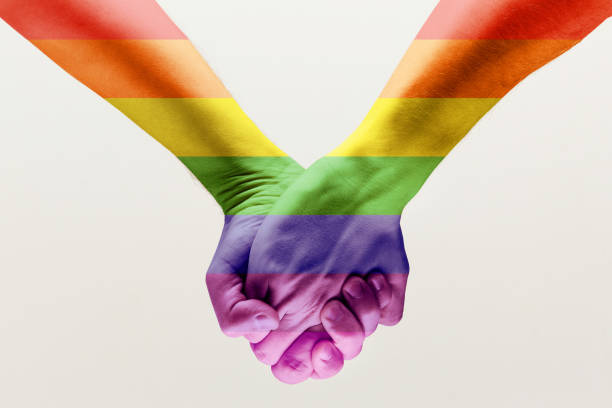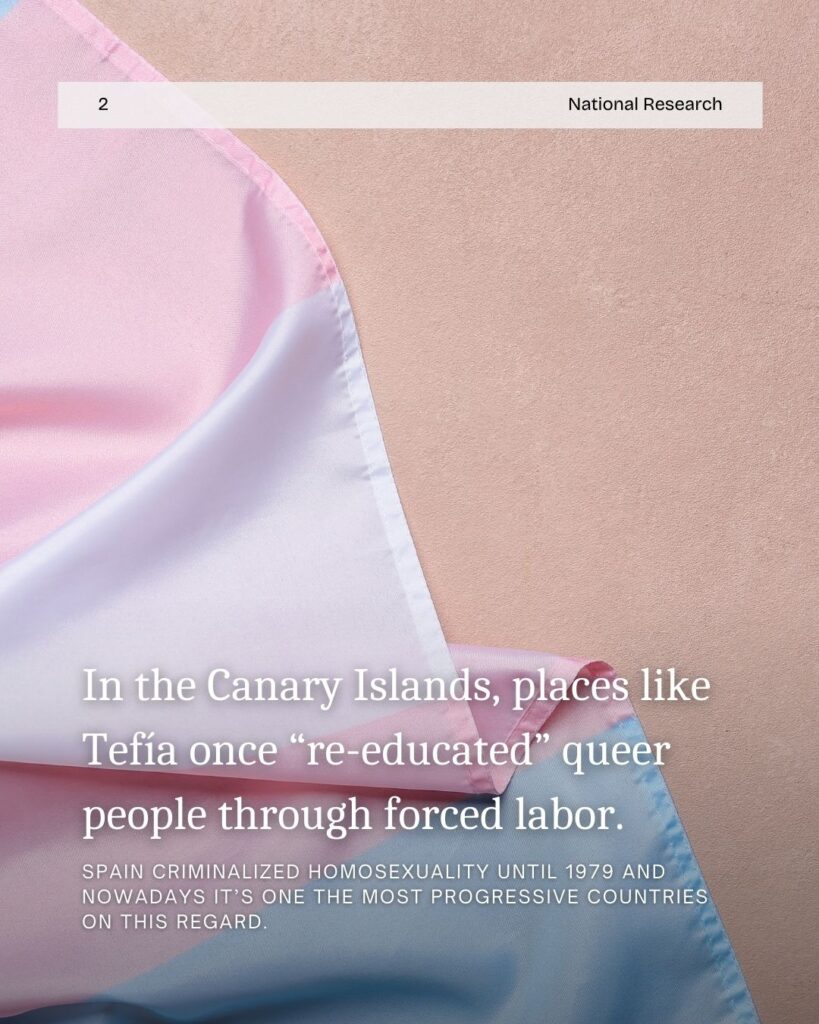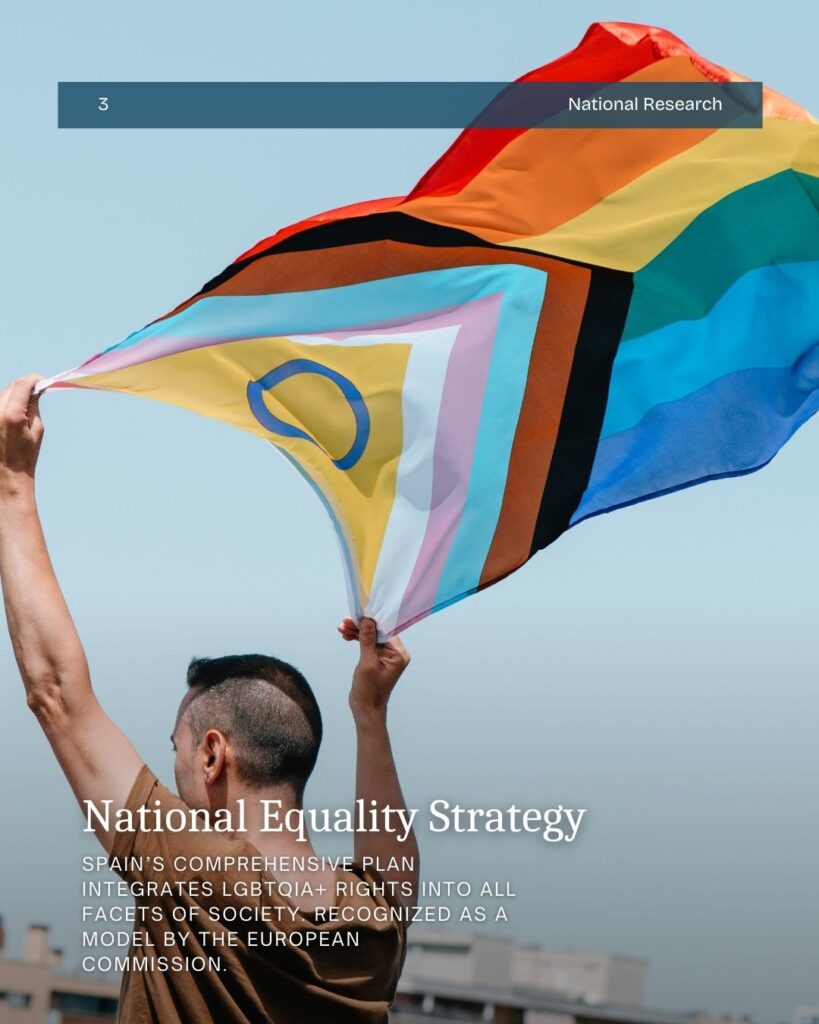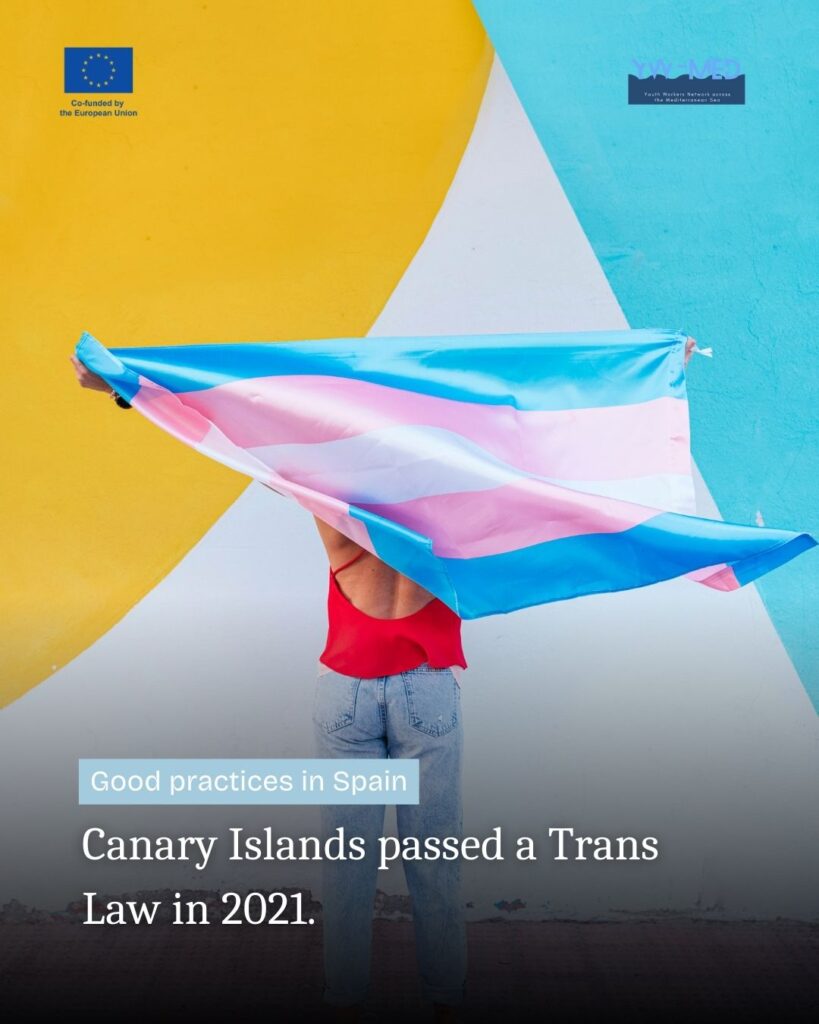
National Research on LGBTQIA+ Inclusion in Spain: Realities from the South and the Canary Islands
By the Spanish Team Alma Lisét González Dávila, Rubén Lázaro y Nicole Aldunate
As part of the transnational initiative Youth Workers Across the Mediterranean Sea, youth participants from Southern Spain and the Canary Islands have explored the levels of inclusion and exclusion experienced by LGBTQIA+ individuals in their territories. Their findings reflect both meaningful social progress and the persistence of systemic challenges—especially for young people, those in rural areas, and individuals seeking mental health support
From Repression to Rights: A National Overview
Spain has evolved into one of the most progressive countries in the world regarding LGBTQIA+ rights, but this transformation came after decades of repression. Under Franco’s dictatorship, homosexuality was considered a crime and a social threat. The Ley de Peligrosidad y Rehabilitación Social (1970) marked a dark era in which LGBTQIA+ people were imprisoned, sent to “rehabilitation” centers, or confined to remote prisons such as Tefía in Fuerteventura—now a symbol of memory and reparation.
Key turning points included:
- The partial decriminalization of homosexuality in 1979,
- The full reform of the Penal Code in 1995,
- The landmark Equal Marriage Law in 2005,
- And the more recent Trans Law (2021) which affirms gender self-determination.
Despite these milestones, legal equality does not always guarantee lived equality, particularly for young and marginalized LGBTQIA+ people.


The Canary Islands: Between Tourism, Activism, and Rural Struggles
In the Canary Islands, the LGBTQIA+ movement experienced delayed visibility, with activism taking root in the 1990s through associations like GAMÁ (Gran Canaria) and Diversas (Tenerife). These groups played a vital role in raising awareness, promoting sexual health, and fighting stigma.
Maspalomas, in Gran Canaria, emerged as a global LGTBIQ+ tourism hub in the 2000s, contributing to visibility and economic growth. Events like Maspalomas Pride and Winter Pride have helped normalize queer identities—although concerns about commercialisation remain.
In recent years, institutional efforts have significantly increased:
– The Canarian Trans Law (2021) goes beyond national legislation in affirming gender identity.
– The Canarian Strategy for Gender Equality and Diversity 2022–2026 includes specific action plans for LGBTQIA+ inclusion.
– New support networks have extended to smaller islands such as La Palma and Lanzarote, marking progress in decentralizing support.
Still, challenges persist, especially in non-urban settings. Young LGBTQIA+ people in the Canary Islands—particularly in rural or conservative areas—face bullying, social rejection, and limited access to health and psychological support.
Andalusia: Mental Health and the Urban-Rural Divide
In Granada, a cultural and academic hub in Andalusia, the LGBTQIA+ community continues to confront high rates of depression, anxiety, and suicidal ideation. Studies show that 32.1% of LGBTQIA+ individuals report suicidal thoughts—more than double the national average.
Major barriers include:
Limited safe spaces to discuss psychological struggles openly.
Lack of healthcare professionals trained in LGBTQIA+ issues,
Discrimination within medical services, with 46% reporting some form of mistreatment,
Limited safe spaces to discuss psychological struggles openly.
Local initiatives, such as those led by Andalucía Diversidad LGBT and university-based programs, have created essential support structures. Yet, these resources remain inconsistent and under-publicized, especially outside urban areas.
Rural Realities Across Regions
Across both Andalusia and the Canary Islands, rural LGBTQIA+ individuals face unique and compounded challenges. While urban centers offer increasing acceptance and specialized services, life in small towns and isolated areas often involves:
- Living in secrecy due to family and community stigma,
- Lack of anonymity and safe spaces,
- Greater exposure to conversion narratives or psychological pressure to conform,
- And scarcity of trained mental health providers.
Coming out in these environments can still result in social ostracism or emotional trauma, particularly for youth who rely on their families for support and housing.
The lack of local, visible, and culturally competent support means that young rural LGBTQIA+ individuals often face a double exclusion—from broader society and from urban LGBTQIA+ networks.

Proposals and Paths Forward
The findings of this research point to urgent needs and actionable proposals:
Educational campaigns to fight stigma and normalise diversity across all territories.
Training for healthcare and educational professionals on LGBTQIA+ realities.
Expansion of inclusive mental health services, with outreach to rural and island communities.
Creation of safe, visible spaces for LGBTQIA+ youth to access support without fear.
Increased funding and visibility for grassroots organizations, particularly those working outside large cities.

Progress with Gaps Still to Fill
Spain has undoubtedly made great strides in the legal and social recognition of LGBTQIA+ rights. Yet, the lived experiences of LGBTQIA+ individuals in Southern Spain and the Canary Islands—especially in rural or less visible contexts—reveal ongoing challenges related to mental health, access to care, and cultural inclusion.
This research, conducted as part of the Youth Workers Across the Mediterranean Sea project, highlights the importance of intersectional, youth-driven perspectives in shaping future policy and action.
By amplifying local voices, especially from non-central regions, we take one step closer to an inclusive future—where no one is left behind because of where they live or who they are.